plaud-, plaus-, plod-, plos-
(Latin: to clap, to strike, to beat; to clap the hands in approbation [recognition as good], to approve)
1. An act, or acts, of applauding; a clapping of the hands, or other audible expressions of approval or praise; hence, any emphatic expression of support: The audience gave the pianist long plaudits because his musical performance was so magnificent!
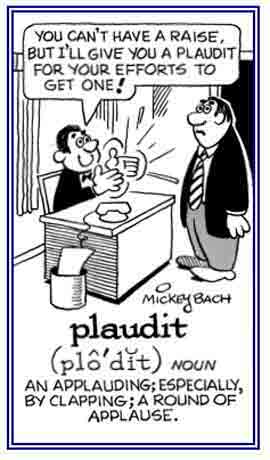
© ALL rights are reserved.
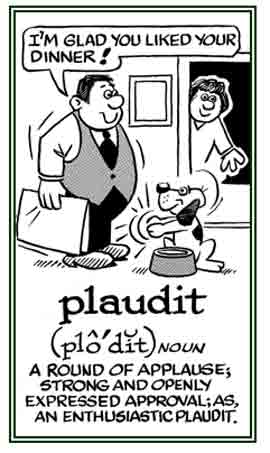
© ALL rights are reserved.
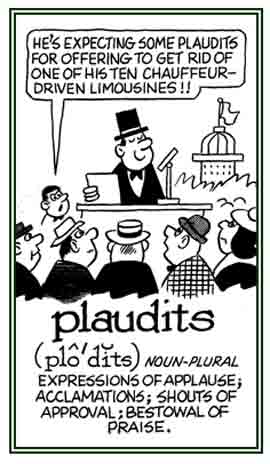
© ALL rights are reserved.
Go to this Word A Day Revisited Index
The play won the plaudits and acclaim of the audience and of the local newspaper.
2. Etymology: from Latin plaudite "applaud" from plaudere from the customary appeals to the audience made by Roman actors at the end of a play to express admiration for the performance.


Go to this Word A Day Revisited Index
so you can see more of Mickey Bach's cartoons.
plaudite
1. An appeal for applause at the conclusion of a play or other performance. Now only as Latin.
2. A round of applause (plaudit).
2. A round of applause (plaudit).
plauditory
1. Demonstrating enthusiastic approval or applause.
2. Applauding, applausive, commending, and laudatory.
2. Applauding, applausive, commending, and laudatory.
plausibility
1. A description of that which has the appearance of truth but might be deceptive.
2. That which is likely to be true or able to be believed.
2. That which is likely to be true or able to be believed.
plausible (adjective); more plausible, most plausible
1. Relating to having an appearance of truth or reason; seemingly worthy of approval or acceptance; credible: Hank made a plausible excuse for being late to the meeting.
2. Believable and appearing likely to be true, usually in the absence of proof: Since Jake was never known to tell a lie, his reasons for coming late to the dinner party were considered to be plausible.
3. Having a persuasive manner in speech or writing, often combined with an intention to deceive: Because Joe was so smooth-talking and seemed to be plausible, the listeners were conned into believing his arguments against his political opponent.
4. Etymology: from Latin plausibilis, "deserving applause, acceptable, agreeable"; from the past participle stem of plaudere, "to applaud". The meaning "having the appearance of truth" is recorded from 1565.
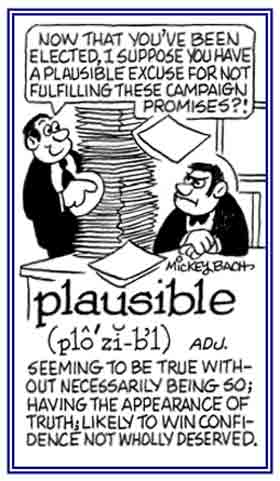
© ALL rights are reserved.
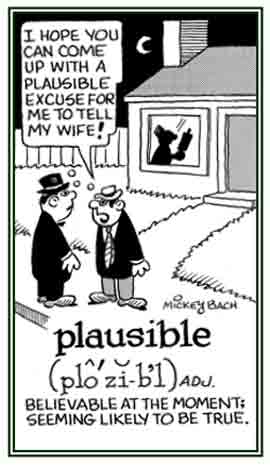
© ALL rights are reserved.
Go to this Word A Day Revisited Index
2. Believable and appearing likely to be true, usually in the absence of proof: Since Jake was never known to tell a lie, his reasons for coming late to the dinner party were considered to be plausible.
3. Having a persuasive manner in speech or writing, often combined with an intention to deceive: Because Joe was so smooth-talking and seemed to be plausible, the listeners were conned into believing his arguments against his political opponent.
4. Etymology: from Latin plausibilis, "deserving applause, acceptable, agreeable"; from the past participle stem of plaudere, "to applaud". The meaning "having the appearance of truth" is recorded from 1565.


Go to this Word A Day Revisited Index
so you can see more of Mickey Bach's cartoons.
plausibleness
1. A description of that which has the appearance of truth but might be deceptive.
2. Appearing to merit belief or acceptance:
2. Appearing to merit belief or acceptance:
plausibleness
1. An apparent validity.
2. Appearing to merit belief or acceptance.
2. Appearing to merit belief or acceptance.
plausibly
1. Easy to believe on the basis of available evidence.
2. In a plausible manner.
2. In a plausible manner.
plausive
1. Showing or expressing praise or approbation; applauding.
2. Expressing or manifesting praise or approval.
2. Expressing or manifesting praise or approval.
plod (verb), plods; plodded; plodding
1. To move or walk heavily or laboriously; to trudge with a slow heavy tread: After hours of plodding up into the mountains, James and his family were glad to start their way back down to their camp.
2. To work or act perseveringly or monotonously; to drudge: The teacher spent several hours plodding through a stack of student essays.
3. To walk heavily, slowly, and firmly, as when weary, or struggling through mud: Maurice and Lydia plodded through mud that came up over their shoes when they were near the stream.
2. To work or act perseveringly or monotonously; to drudge: The teacher spent several hours plodding through a stack of student essays.
3. To walk heavily, slowly, and firmly, as when weary, or struggling through mud: Maurice and Lydia plodded through mud that came up over their shoes when they were near the stream.
plod, plods (noun)
1. The act or process of moving or walking heavily and slowly.
2. The sounds made by heavy stepping or walking: "The dancers started to perform when they heard the familiar plod or thud of the drums."
2. The sounds made by heavy stepping or walking: "The dancers started to perform when they heard the familiar plod or thud of the drums."
plode (a slang term)
1. Something which is extremely great and powerful that conquers everything else.
2. An implosion and an explosion happening at the same time, therefore canceling out each other.
2. An implosion and an explosion happening at the same time, therefore canceling out each other.
supplode
To stamp with the feet.
unexploded
1. Still capable of exploding or being fired; undischarged.
2. Having failed to explode but still capable of exploding.
2. Having failed to explode but still capable of exploding.
unplausible
Not plausible; not having a fair appearance; such as, her arguments are simply unplausible.


